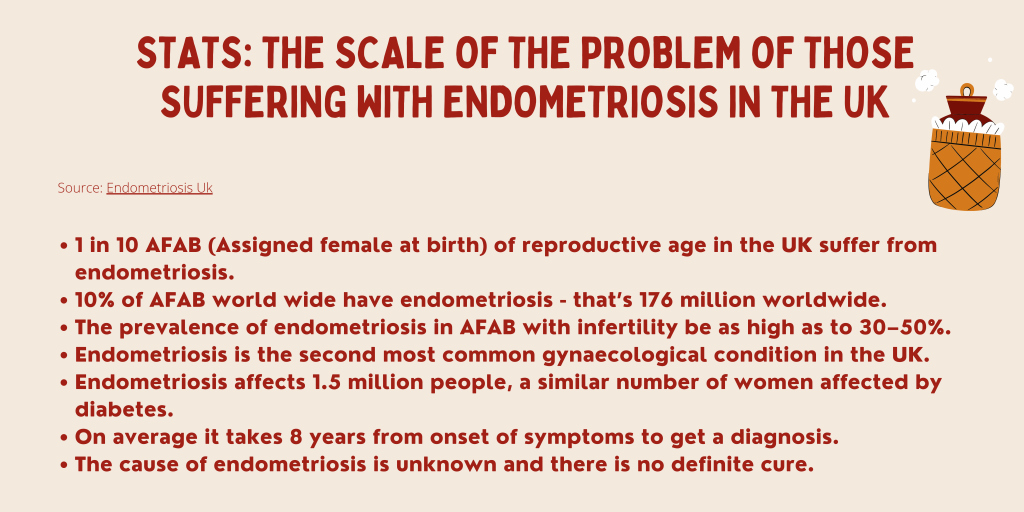Debates over increasing funding for English endometriosis care happened in Parliament last month, why are those suffering in Wales not getting the same consideration?

Gynaecological health campaigners see it as a topic that’s finally starting to get the recognition that it’s long been owed.
Endometriosis and PCOS are gynaecological conditions common in as many as 1 in 10 women/AFAB. The chronic illness can cause symptoms of pain, loss of fertility, loss of normal organ function and results in many sufferers having to give up their jobs and overall, giving a very poor quality of life to thousands across the country. Many of whom go undiagnosed.
“When they said it might mean I wouldn’t be able to have children I kind of shutdown, I nearly cried in the doctor’s room,” one anonymous woman said in response to finding out about her diagnosis of PCOS.
According to the NHS, PCOS is when your ovaries become enlarged and contain many fluid-filled sacs that surround the eggs similar to cysts causing irregular menstruation and impacting fertility.
Whereas endometriosis occurs where cells similar to the ones in the lining of the womb (uterus) are found elsewhere in the body. Each month these cells react in the same way to those in the womb, building up and then breaking down and bleeding. Unlike the cells in the womb that leave the body as a period, this blood has no way to escape.
Yet until now, many experts say NHS funding towards the condition has been criminally underprovided.
It was welcomed by charities such as Endometriosis UK when the UK government debated a £5.9bn increase of funding towards both illnesses in NHS England in the House of Commons last month. However, because of the devolved NHS, said funding increases (if they were to go through) wouldn’t impact the lives of those suffering in Wales.
Many clinicians and patients describe endometriosis care in Wales as being at a crisis point
Rachel Joseph (Fair Treatment for the Women of Wales)
The House of Commons have debated it, why not the Senedd?
So how are the Welsh government tackling this health crisis and are they doing enough? The answer is complicated, but on the face of it, charities are saying no they aren’t doing enough.
In 2018, the Welsh government co-authored a report with the Fair Treatment for the Women of Wales (FTWW) suggesting much more drastic measures should be implemented towards care for those suffering with endometriosis.
However, when contacted on progress made since the report, FTWW spokesperson Rachel Joseph, admitted, “progress regarding patient access to care has been, very sadly, limited.”
She then added that, “Many clinicians and patients describe endometriosis care in Wales as being at a crisis point,” with patient waiting times being, “in excess of five years.”
Rachel also highlighted how for those not resident in the nation’s capital, referrals for the condition are regularly refused due to funding arrangements. This was raised recently by Wales Online, revealing there are only two specialist surgeons in Wales and only one specialist clinic (in Cardiff).
I could’ve been helped more with understanding what my diagnosis actually meant
Anonymous PCOS sufferer

Only one place in the whole country, for a condition that’s as common as diabetes in Wales and evidently can be just as dangerous and life-changing.
This is a brutal reality for those suffering in Wales. The woman quoted at the start of the piece asked for anonymity because she says, “I feel embarrassed that my body doesn’t function like everyone else’s.”
She also says, “I could’ve been helped more with understanding what my diagnosis actually meant but the communication between the endocrinologist and my GP is so slow it took at least four months to be seen between my first and second appointments,” in Cardiff.
However, the organisations surrounding this issue are starting to put pressure on the Welsh government and Rachel from FTWW, reveals that there’s reason for hope among those suffering.
How are different groups pushing for improvements to endometriosis care after Covid-19?
Rachel says, “There has been some positive progress that should not be overlooked.”
FTWW have set up a petition, similar to the one that led to the House of Commons debate, for funding increases for endometriosis care to be debated in the Senedd.
In addition, Rachel commends the Welsh government’s initiative called the Women’s Health Implementation Group (WHIG) in response to the 2018 report.
In an attempt to ask the Welsh government for comment, Alt Cardiff contacted the office of Welsh health minister Eluned Morgan. But, in response she said there was an average waiting time of five weeks to email correspondence due to the overwhelming amount or enquiries she faces in light of the coronavirus pandemic.
However, a Welsh government spokesperson acknowledged that, “Health boards are responsible for delivering high quality gynaecology services and WHIG has funded pelvic health coordinators in each board,” meaning that in theory everyone in Wales should have access to someone who understands illnesses such as PCOS and endometriosis properly.
FTWW also spoke of the introduction of a new website called Endometriosis Cymru due to be launched in March 2022, which had been co-produced by WHIG and Cardiff University Professor, Jacky Boivin.
This website would not only increase awareness for the issue in Wales, but also seeks to lower the diagnostic delay many face.
“It’s quite easy to dismiss, especially when girls are in their teens and going through puberty,” the anonymous woman says. Hopefully this website would reduce that, and also provide care in the case of any future lockdowns, where practically all sufferers of the condition couldn’t be seen by professionals.
But overall, is it enough? Do the Welsh government need to do more?
Rachel says, “There are still several key recommendations made by the 2018 report which need attention.
“Endometriosis care in Wales deserves more recognition and more action at a quicker rate as, for many of those affected, time is running out.”

